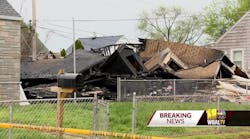A great many challenging ideas have come to me while I have been worshiping. On a recent Sunday, my wife and I spent an enjoyable hour singing hymns at the Colts Neck Reformed Church. Reverend Scott Brown has created a special worship service, letting the congregation select the hymns. Each of us gets a form on which we write the name and number of our favorite hymn, then someone picks slips out of a basket. He calls out each number to the organist and we sing a few selected verses. In this way, each of us has influences the way in which the service flows.
In essence, each worship participant plays a role in the service. However, it is our leader, Scott Brown, who has set the tone and tenor of our worship service. He has created an environment that lets us express our feelings, preferences and perceptions. His talent for drawing out the best in the congregation involves one of the rarely mentioned roles of a leader.
It is my suggestion that a truly effective leader takes positive steps to guide the organizational environment in a positive direction. They create a focus whereby people want to play an active role. They make it a place you want to be rather than a place where you must be.
Let me share some thoughts about a way in which leaders can and should influence their organizations. After all, where would we be without the people who guide our organizations toward that uncertain place called the future? We complain about the need to change; however, an effective leader will create an environment where people seek out and embrace the future, rather than cowering in fear.
We complain that we need members, but then we make leaders of those who do everything in their power to drive people away. Something is wrong.
Over the past few years, many of you have asked about the role of leaders in everyday life. In some cases, you have bemoaned the lack of leadership in your world. Others have railed against the bad leadership that has made a shambles of your life. The rarest of all messages from you involves praise for those good leaders among us.
It is my intention to lay out one of the most important tasks that leaders must accomplish. This would be the way in which they create the operational environments for their organizations. It is up to the leaders to set the tone and tenor of their environments. Sadly, far too many leave this important task to chance. These people spend their entire careers winging it. They provide no direction, no guidance and little in the way of caring or concern for the people who are looking to them for guidance. They just flit from crisis to crisis, flailing their arms and flapping their lips.
Life is not a chance occurrence. Far too many leaders fail to recognize that they can and should have an impact on the people around them. Even worse are the people who care only for their own selfish wants and needs. They live by one half of the famous "one for all and all for one" motto. Everything is OK for them only as long as they are the ones who are allowed to gather in the "all."
The truly effective leaders learn how to tune into the inner spirit of their organizations. They learn early on that the people for whom they are responsible require a comfortable environment to create the greatest gain for the organization. They are comfortable around people and enjoy working with others on a regular basis.
Let me use a very simple, but appropriate example. Think about how the way in which the conductor of an orchestra works to create the approach an orchestra will take toward interpreting the music of a particular composer. The conductor recognizes that he or she is responsible for creating the environment wherein dozens of musicians come together to make beautiful music. A number of factors are at work. The interest, education and experience of the conductor are brought into play in the creation of an ensemble's musical repertoire.
The manner in which a conductor has climbed the ladder of success will also play a great part in determining the success or failure of the operation. If a conductor does not like the work of a particular composer, that music will gather dust in the archives of the orchestra's library. It matters not what the members of the orchestra think or care. The musical preferences of that leader will create the parameters of that group's environment. Does that sound familiar?
If the education of the conductor has led them in the direction of a particular school of musical thought, then that is the genre with which they feel comfortable. Hence, they will play things that fall within their comfort zone. Some have experienced a very tightly controlled musical education. These people will be rigid in the creation of their environment. Does that sound familiar to you?
Some conductors solicit the opinions of their musicians. Others do not. Some maestros care about the mental attitude of their musicians, while others couldn't care less about how their people feel. Others work to create an atmosphere that is conducive to good feelings. The same is true in the world of fire and emergency services.
If you are a leader, or aspire to be a leader, you will discover that you too have the same opportunities to create an environment. It has been my pleasure to have labored for some really neat leaders. They were able to create an environment of caring and sharing. These folks were open and caring. You always knew where you stood. They were open to discuss things and willing to listen to the other person's opinions. Others really did not give a hoot about anyone other than themselves. They created an environment of confusion.
The really good leaders knew the job and were well aware of what needed to be done. The work was usually tough, dirty and dangerous. These fine men also cared more about people than things. We were far more than just numbers to them. They laid out the requirements, created a great environment, and were lavish in their praise of a job well done. We were able to navigate through the environment they created for us. In short, they were a joy to work with. The environment they created was stimulating. Their support was outstanding. Many of us worked to emulate the lessons learned from them.
It is my hope that you see the need in your organization for an environment wherein you can enjoy playing your part in the overall accomplishment of its mission, goals and objectives. If you are the follower, work to play a solid part. Let the powers that be know they can count on you when the going gets rough.
If you are the leader, it is up to you to do your job. Set the tone and tenor of your operation and work hard to create an environment that is both stimulating and supportive. The job must be done, one way or the other. Is it not better to create a place where you people will enjoy contributing and participating? The call is yours.
Harry R. Carter, Ph.D., CFO, MIFireE, is a Firehouse contributing editor. A municipal fire protection consultant based in Adelphia, NJ, he is the former president of the International Society of Fire Service Instructors. He is a past chief and active life member of the Adelphia Fire Company. Currently the chairman of the Board of Fire Commissioners for Howell Township District 2, he retired from the Newark, NJ, Fire Department in 1999 as a battalion commander. He also served as chief of training and commander of the Hazardous Materials Response Team. Dr. Carter is secretary of the United States Branch of the Institution of Fire Engineers of Great Britain (MIFireE). You can contact him through at [email protected].





